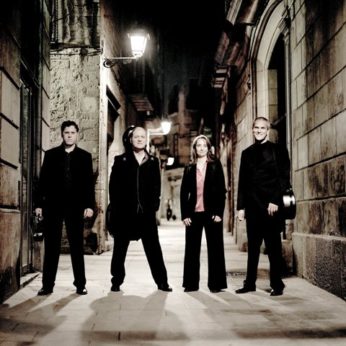Composer: Dmitri Shostakovich (b. 1906 - d. 1975)
Performance date: 02/07/2013
Venue: Bantry Library
Composition Year: 1966
Duration: 00:18:36
Recording Engineer: Damian Chennells, RTÉ lyric fm
Instrumentation: 2vn, va, vc
Instrumentation Category:String Quartet
Artists:
Cuarteto Casals (Abel Tomás Realp, Vera Martinez Mehner [violins], Jonathan Brown [viola], Arnau Tomás Realp [cello]) -
[quartet]

This Quartet is the first of four dedicated to individual members of the original Beethoven Quartet, that premiered all of Shostakovich’s quartets except the first and the last. The dedicatee was Vasili Shirinsky, the second violinist in the Quartet; who had died the previous year. The quartet is cast very much in the mood of the Seventh Quartet that he wrote in memory of Nina, his first wife; that is without overt sorrow or mourning, more a reminder of their lives and what they had meant to the composer. And again like the Seventh it is epigrammatically brief with the seven perfectly crafted movements flowing into each other without a break.
The premiere of this work also saw the first performance of his Five Romances on Texts from Krokodil when unusually he chose to accompany Galina Vishnevskaya and Evgeny Nesterenko. Unusually, that is, because his hands were affected by his illness and he was terrified they would let him down in public. The nervous strain and the stiflingly hot concert hall were too much for him and he had his first heart attack the next night. He managed to recover in time for his sixtieth birthday concert that September, which included the premiere of his Second Cello Concerto by Rostropovich.
Just to give an idea of the brevity of this work, none of the first five movements last as long as 3 minutes and the last two only just exceed 4 minutes, so we are into Kurtag-like compression. The movements are unified by a miniature chorale theme heard midway through the Introduction. This theme provides the melodic outline for the succeeding Scherzo and runs like a thread through the other movements. The work is begun by a sinuous theme in the first violin that dominates that movement entirely apart from the statements of the chorale. The same instrument leads the way into the restrained little Scherzo, where the chief topic is a series of delightful jokes passed from one voice to another. The Recitativ provides the shudder of violence missing from the Scherzo, but it is gone in a flash. The Etude is a wild flurry from the first violin leading totally unexpectedly into another fortissimo outburst and suddenly we are in the Humoreske, which cruelly spotlights the second violin with the cuckoo clock-like mechanical repetition that frantically drives the movement along with the witty postscript. The second violin gets kinder treatment in Shirinsky’s Elegy, where he is given the espressivo lamentation over the throbbing bass but has to return to his more normal filling-in role in the Finale. The transition to this movement is pure magic, almost ethereal as the lament fades into the gently susurrating opening bars with the chirpy variant of the theme in witty counterpoint. As a farewell to a colleague of forty years standing, it would be hard to find anything more touching than this self-effacing movement; the jokes from the Scherzo are recalled and the passacaglia bass from the Elegy is inevitably brought back for the last goodbye. The dying fall at the very end is perfection.
Copyright © 2025 West Cork Music. All rights reserved.
Designed and developed by Matrix Internet